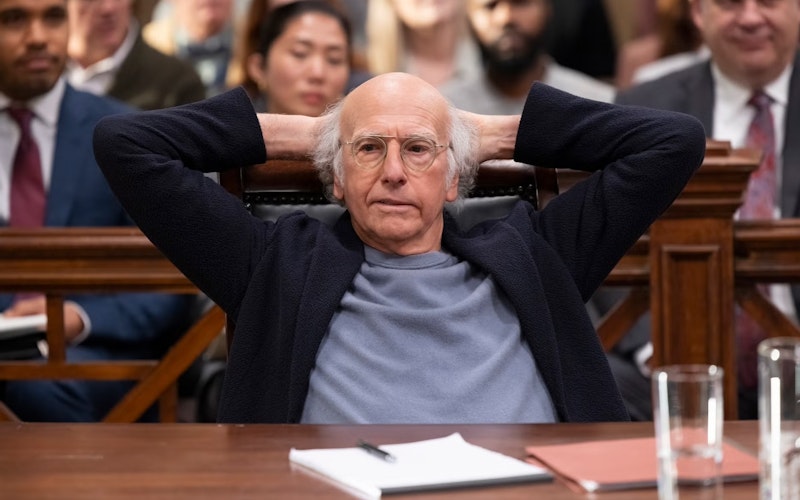
TV
Curb Your Enthusiasm’s Grace-Filled About-Face
Imagine Seinfeld’s George Costanza with a lot more money and even less of a filter.
That’s how I’ve thought of “Larry David,” played by Seinfeld co-creator Larry David over the course of 12 seasons of HBO’s Curb Your Enthusiasm. Whereas Seinfeld’s George (Jason Alexander) was a thinly veiled version of David on that landmark sitcom, David essentially plays himself on Curb—a semi-retired comedy writer spending his gobs of Seinfeld money eating out and playing golf around Los Angeles, irritating and insulting almost everyone he meets with his petty obsessions and rude observations, usually with no lasting repercussions.
Until the recent series finale, that is. (Spoilers ahead.) “No Lessons Learned” finds Larry literally on trial in Georgia for handing a bottle of water to a friend while she waited in line to vote—an apparent infraction of election law. While this initially made Larry something of a folk hero, he gradually squandered that goodwill over the course of the season with his arrogance, disingenuousness, and all-around disregard for being—to borrow one of the season’s buzzwords—“cordial.” The prosecuting attorney (a delightfully smug Greg Kinnear) takes advantage of this by putting character witnesses on the stand to testify to Larry’s self-centeredness over the years. Among them? Mocha Joe (Saverio Guerra), a coffee-shop owner Larry tried to put out of business by opening a “spite store” next door.
If this sounds familiar, that’s because Seinfeld’s two-part finale, which was written by Larry David, also concludes with a trial. Jerry (Jerry Seinfeld), Elaine (Julia Louis-Dreyfus), Kramer (Michael Richards), and George have been arrested in a small town for failing to help a man while his car was being stolen. Jailed under a Good Samaritan law and taken to court, where testimony is given by aggrieved characters from throughout the show’s history, they’re found guilty of “criminal indifference.” The series ends with them in a shared cell, where they fall back into the same sort of self-obsessed nattering that drove the entire series (in this case, about the placement of a button on George’s shirt).
That Seinfeld finale was largely regarded as a failure at the time of its 1998 airing. In essentially recreating it for the ending of Curb, Larry David seems to be engaging in yet one more act of stubborn selfishness. (“You didn’t like how we ended Seinfeld? Who cares! I’m doing it again.”) But then something amazing happens in “No Lessons Learned.” After Larry is convicted—his own lawyer (Sanaa Lathan) admits in court that he is guilty of breaking the law—he sits in a jail cell, commiserating about the shape of his pants. Then he gets a visitor: Jerry Seinfeld himself. In town for the trial, Jerry brings good tidings of great joy. Since one of the jurors broke the rules of sequester, a mistrial has been declared. (As Larry puts it, “He’s a bad sequesterer!”)
In town for the trial, Jerry Seinfeld brings good tidings of great joy.
Note that Larry isn’t exonerated. “There is no one righteous, not even one,” the Apostle Paul wrote in Romans 3. (And Paul didn’t even know Larry David.) Larry’s kindly—and out-of-character—intentions when he offered that water didn’t end up saving him. He didn’t prove himself righteous, but was instead saved by a gift in the form of a comedic twist. This is what Frederich Buechner is after when he writes about “the comic truth of the Gospel.” God’s response to our sin—to pursue us anyway and redeem us through the person of Jesus Christ—is so nonsensical as to be laughable. This isn’t the way the universe is supposed to work, to our minds, yet God makes it so with a cosmic joke.
Like Larry, we’re all guilty. As I wrote earlier at TC, I appreciate Seinfeld for the way the show comically forces me to confess this. It and Curb Your Enthusiasm function, in effect, the way Paul later describes the law in Romans 3: “Now we know that whatever the law says, it says to those who are under the law, so that every mouth may be silenced and the whole world held accountable to God.” How fitting that both Seinfeld and Curb ended up in court.
Yet God doesn’t leave us to rot in the jail cells of our own making. Rather, we’ve been given good news: that while we were still sinners, Christ died for us. “You’re a free man,” the Archangel Jerry says to an incredulous Larry. “Mistrial declared. Sentence thrown out. You’re done.”
What will he do with his freedom? If I had to guess, I’d say he’ll go back to being the same old Larry. The final scene, in which he gets into a screaming match on the airplane ride home over whether or not the window shade should be open, certainly suggests this. With no lessons learned, Larry goes on his selfish, insensitive way, assuming that his good fortune can be credited to the one thing he does believe in: human stupidity, on the part of the irresponsible juror.
But maybe, just maybe, Larry will live the way we’re all called to live in the wake of saving grace. God’s gift doesn’t mean we can “go on sinning.” Rather, we are free to live lives of gratitude, doing our best to resist our inclination toward selfishness, yet knowing that we are nonetheless forgiven.
Yeah, that doesn’t sound like Larry David. But maybe it could be you and me.
_______________
At Think Christian, we encourage careful cultural discernment. We recognize and respect that many Christians choose not to engage with pop culture that contains particular content, such as abuse, sex, violence, alcohol or drug use, or that employs the use of coarse language. To that end, we suggest visiting Common Sense Media for detailed information regarding the content of the particular piece of pop culture discussed in this article.
Topics: TV